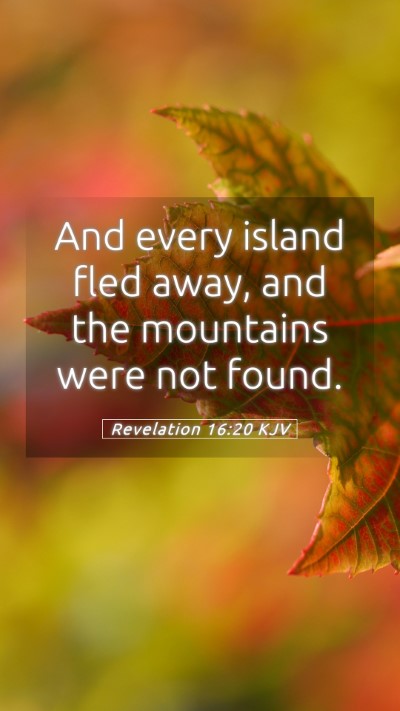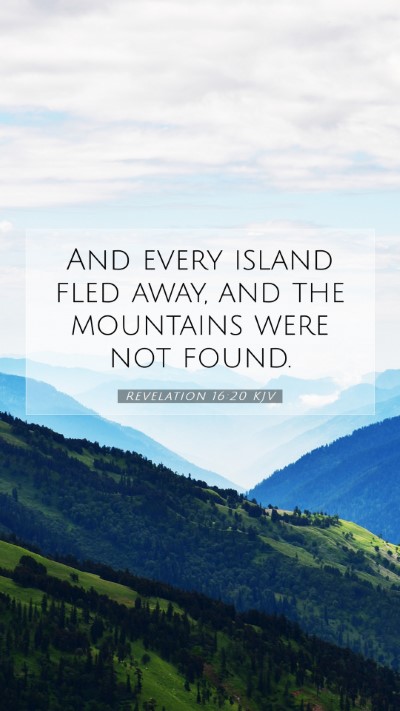Bible Verse Commentary on Revelation 16:20
Verse: Revelation 16:20 - "And every island fled away, and the mountains were not found."
This verse emerges in the context of the climactic events of God's judgment during the end times. To gain a comprehensive understanding of this verse, it is essential to combine insights from respected public domain commentaries such as those by Matthew Henry, Albert Barnes, and Adam Clarke.
Contextual Overview
Revelation 16 is a pivotal chapter that describes the pouring out of the seven bowls of God's wrath. Within this chapter, verse 20 highlights the total upheaval of creation as a direct consequence of divine judgment. The imagery of islands fleeing and mountains disappearing symbolizes a profound alteration to the natural order.
Commentary Insights
-
Matthew Henry:
Henry states that the disappearance of islands and mountains signifies the removal of stability and refuge on earth. The natural barriers of islands and mountains, which typically provide shelter and safety, are obliterated, paralleling the complete upheaval and dismantling of earthly structures as God’s judgment unfolds.
-
Albert Barnes:
Barnes explains that this prophetic imagery illustrates that God's judgment will be universal and affecting all creation. His interpretation emphasizes how the judgment consumes what is traditionally thought to be enduring and stable, indicating the totality of divine retribution and the ultimate authority of God over all existence.
-
Adam Clarke:
Clarke provides an exegesis that links the disappearance of physical features of the earth to the spiritual significance of God's judgment. He highlights that such events serve as a reminder of the vanity of earthly institutions and how ultimately they cannot withstand God's sovereign will.
Meaning and Application
Revelation 16:20 can be understood in several layers, which resonates with contemporary readers in profound ways:
-
Distinction of the Temporal:
The verse underscores the transitory nature of worldly existence. Believers are urged to focus on eternal truths rather than temporal securities, emphasizing the importance of spiritual stability over earthly fortresses.
-
Call to Repentance:
This imagery serves as a stark reminder of the consequences of sin and rebellion against God. In the face of such overwhelming judgment, individuals are encouraged to seek repentance and a closer relationship with God.
-
Hope Amid Judgment:
Though the verse describes catastrophic changes, it is also a precursor to restoration. Understanding this passage can lead to deeper reflection on God's mercy and the hope that follows judgment, as outlined later in Revelation.
Related Bible Cross References
- Matthew 24:29 - "Immediately after the tribulation of those days shall the sun be darkened, and the moon shall not give her light, and the stars shall fall from heaven..."
- Isaiah 40:4 - "Every valley shall be exalted, and every mountain and hill made low..."
- 2 Peter 3:10 - "But the day of the Lord will come as a thief in the night; in which the heavens shall pass away with a great noise, and the elements shall melt with fervent heat..."
Conclusion
In conclusion, Revelation 16:20 serves as a powerful testament to the ultimate authority of God over creation. By exploring this verse through the lens of respected biblical commentaries, believers can attain profound insights into its meaning and importance for their spiritual lives. This examination not only enriches our Bible study but also provides clarity for those seeking understanding in the complexities of Scripture.
This commentary aims to assist readers in their journey of Bible verse interpretations and understanding Scripture effectively, supporting them as they delve into in-depth Bible verse analysis.


